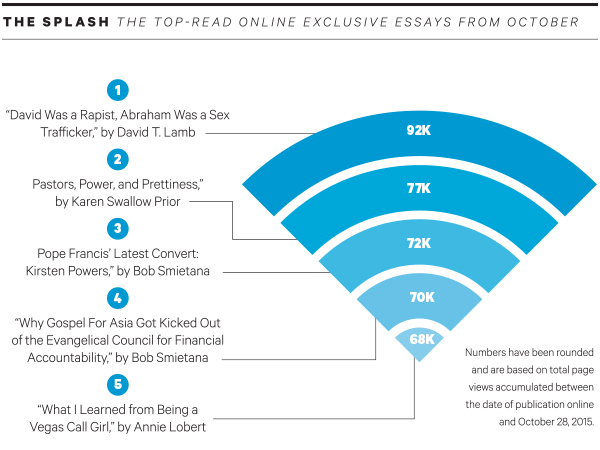The Truth about Heresy
Understanding the difference between heresy and heterodoxy as described in Justin Holcomb’s clear article is critical for Christian unity. I found this to be true in the small Bible study group I held in my home for 17 years. We had people from different churches, Protestant and Catholic. I stressed that agreeing on the foundations of our faith in the Nicene Creed kept us unified.
Those who debate the predestination issue distance themselves from those who disagree as if they were heretics. I have cautioned people to resist this temptation.Jim HiltSheboygan, Wisconsin
Such an overdue rebuke of the church’s current addiction to the word “heresy.”@johnmarkcomer (Twitter)
I tell students a heresy is usually an effort to resolve one of Christianity’s key paradoxes, but here is CT’s take.@MollyWorthen (Twitter)
The New Battle for the Bible
Mark Galli’s editorial “The New Battle for the Bible” focused the entire October issue. In my 32 years of ministry at a Christian school, I have seen Christian groups increasingly depend on other sources of truth as our first choice for faith and practice. It feels good to use best practices from business, psychology, education, and marketing. But popular practices often do not originate from the Bible.
The Bible often looks foolish to the world and to the consensus confirmed by research and surveys. But God’s Word is sufficient for equipping us for every good work. What radical changes would we make in our organizations if we went to the Bible first?Joe NeffLittle Rock, Arkansas
I completely agree with “The New Battle for the Bible,” and am glad to hear CT express it. Yet as I think back to articles I’ve read in CT, you have not always carried this out regarding creationism. Mark Galli writes, “Fidelity to the Bible has long been an essential part of evangelical identity. . . . We believe it crucial to adhere to the plain meaning of the text unless overwhelming evidence suggests otherwise.” Yet you publish the views of those who adhere to progressive creation—an old earth, the big bang, and so on. These views disregard the “plain meaning of the text.”
I hope that the excellent resolution to “return to Scripture as our final authority” will pertain to every area that the Bible covers—including how we began.Denise HaysOlympia, Washington
The primary purpose of the Christian Scriptures is to reveal Christ, who in turn reveals the nature of God. The Scriptures are a means to an end, not an end in themselves. We don’t worship a book of words, but a person who is the Word. There is a significant difference.Chad Anthony Rhodes (Facebook)
The milk of therapeutic Christianity is no substitute for serious Bible study.@GalenCarey (Twitter)
One Flesh, Two Callings
Thankfully my husband recognised what God had done and was doing in me, as I did with him. He pushed me forward to speak, despite my natural shyness as he could hear the Holy Spirit through me, as I did with him.
I lost my husband in February after 26 years of being one in God. I miss him so much.Marion Burdon Birmingham, UK (Facebook)
I thought this article was about a Cubs fan marrying a Cardinals fan.Stel PontikesSt. Louis, Missouri
The Real Woman at the Well
At last, another take on the Samaritan woman! For years I have been troubled by the characterization of her as an adulterer at worst and a multiple divorcée at best. None of these statements are found in the text. It was refreshing to read this well-researched alternative viewpoint, bringing to light first-century realities, particularly for women. This story tells us much about Jesus, how ready he was to cross cultural, racial, and religious boundaries for genuine seekers of truth.Verna ZookIowa City, Iowa
Jesus knows our hearts and our sins, and waits for us to turn to him. Lynn Cohick misses the most important aspect of this story: that Jesus first reveals to this woman that he is the Messiah. She becomes not only the first to hear the news, but also the first evangelist as she runs to tell the town about him. That is the point: that we tell others about him. Sometimes it’s in the context of our testimony, but it is his story that matters, not so much our own.Elizabeth SandenRidgefield, Connecticut
It Happened One Night
I love hearing people’s conversion stories. It’s a constant reminder that God is at work in the world and is doing miracles that the world doesn’t notice. As the Lord himself taught us, “The wind blows where it wishes, and you hear its sound, but you do not know where it comes from or where it goes. So it is with everyone who is born of the Spirit” (John 3:8).Denny BurkDennyBurk.comLouisville, Kentucky
Correction
In June 2015 News, CT reported that Wycliffe Associates is a sister organization within Wycliffe Bible Translators [“The Bible in Two Months,” p. 18]. In fact, Wycliffe Associates is separate from Wycliffe Bible Translators. We regret the error.












